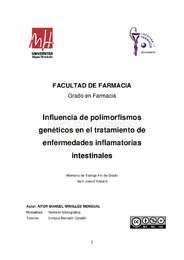Por favor, use este identificador para citar o enlazar este ítem:
https://hdl.handle.net/11000/36369Registro completo de metadatos
| Campo DC | Valor | Lengua/Idioma |
|---|---|---|
| dc.contributor.advisor | Barrajón Catalán, Enrique | - |
| dc.contributor.author | Miralles Mengual, Aitor Manuel | - |
| dc.contributor.other | Departamentos de la UMH::Ingeniería | es_ES |
| dc.date.accessioned | 2025-04-07T15:34:23Z | - |
| dc.date.available | 2025-04-07T15:34:23Z | - |
| dc.date.created | 2024-11-27 | - |
| dc.identifier.uri | https://hdl.handle.net/11000/36369 | - |
| dc.description.abstract | La enfermedad inflamatoria intestinal (EII) comprende un conjunto de patologías crónicas de origen multifactorial. Sus manifestaciones más conocidas son la enfermedad de Crohn (EC) y la colitis ulcerosa (CU), caracterizadas ambas por una inflamación que afecta al tracto gastrointestinal. Normalmente, el tratamiento de estas enfermedades se inicia con un cambio de hábitos, y se continúa con líneas de tratamiento para la inflamación con fármacos antiinflamatorios como corticoides o inmunosupresores, aunque en casos más graves se da el uso de fármacos biológicos. En la actualidad se conoce la existencia de ciertos polimorfismos genéticos en la población que puedan determinar el resultado clínico de la terapia biológica, sin embargo, la relevancia de cada uno de ellos no está del todo clara. En este Trabajo de Fin de Grado se ha revisado la literatura científica de diferentes bases de datos durante los últimos 7 años (2017-2024), recopilando información sobre aquellos polimorfismos con posibles asociaciones significativas con la respuesta a fármacos biológicos. Se ha recogido información de numerosos genes posibles como predictores genéticos de la respuesta a fármacos biológicos, como los genes FCGR3A, SOCS1, CCL2, NOD2, IL18, TLR2, TLR4, NFKBIA, IL10, IL6, Il23R, SLCO1C1, ADAM17, CXCL12, CDKAL1, ATG16L1, PTPN2, TNF, TNFR, TL1A, HLA. El análisis de los resultados obtenidos pone de manifiesto que la genotipificación de posibles polimorfismos que pueden influenciar en la terapia, debería ser parte esencial en el manejo de las EII, estableciendo una estrategia personalizada para la selección del fármaco más eficaz para el paciente. | es_ES |
| dc.description.abstract | Inflammatory bowel disease (IBD) comprises a group of chronic pathologies of multifactorial origin. Its best known manifestations are Crohn's disease (CD) and ulcerative colitis (UC), both characterised by inflammation affecting the gastrointestinal tract. Treatment of these diseases usually starts with a change of habits, followed by lines of treatment for the inflammation with anti-inflammatory drugs such as corticosteroids or immunosuppressants, although in more severe cases biologic drugs are used. The existence of certain genetic polymorphisms in the population that may determine the clinical outcome of biological therapy is currently known, but the relevance of each of these polymorphisms is not entirely clear. In this Final Degree Work we have reviewed the scientific literature from different databases during the last 7 years (2017-2024), collecting information on those polymorphisms with possible significant associations with the response to biologic drugs. Information has been collected on numerous possible genes as genetic predictors of response to biological drugs, such as FCGR3A, SOCS1, CCL2, NOD2, IL18, TLR2, TLR4, NFKBIA, IL10, IL6, Il23R, SLCO1C1, ADAM17, CXCL12, CDKAL1, ATG16L1, PTPN2, TNF, TNFR, TL1A, HLA. The analysis of the results obtained shows that genotyping for possible polymorphisms that may influence therapy should be an essential part of IBD management, establishing a personalised strategy for the selection of the most effective drug for the patient. | es_ES |
| dc.format | application/pdf | es_ES |
| dc.format.extent | 40 | es_ES |
| dc.language.iso | spa | es_ES |
| dc.publisher | Universidad Miguel Hernández | es_ES |
| dc.rights | info:eu-repo/semantics/openAccess | es_ES |
| dc.rights | Attribution-NonCommercial-NoDerivatives 4.0 Internacional | * |
| dc.rights.uri | http://creativecommons.org/licenses/by-nc-nd/4.0/ | * |
| dc.subject | Polimorfismo Genético | es_ES |
| dc.subject | Polymorphism, Genetic | es_ES |
| dc.subject | Enfermedades Inflamatorias del Intestino | es_ES |
| dc.subject | Inflammatory Bowel Diseases | es_ES |
| dc.subject | Terapia | es_ES |
| dc.subject | Therapy | es_ES |
| dc.subject.other | CDU::6 - Ciencias aplicadas::61 - Medicina::615 - Farmacología. Terapéutica. Toxicología. Radiología | es_ES |
| dc.title | Influencia de polimorfismos genéticos en el tratamiento de enfermedades inflamatorias intestinales | es_ES |
| dc.type | info:eu-repo/semantics/bachelorThesis | es_ES |

Ver/Abrir:
MIRALLES MENGUAL AITOR MANUEL.pdf
1,42 MB
Adobe PDF
Compartir:
 La licencia se describe como: Atribución-NonComercial-NoDerivada 4.0 Internacional.
La licencia se describe como: Atribución-NonComercial-NoDerivada 4.0 Internacional.
.png)